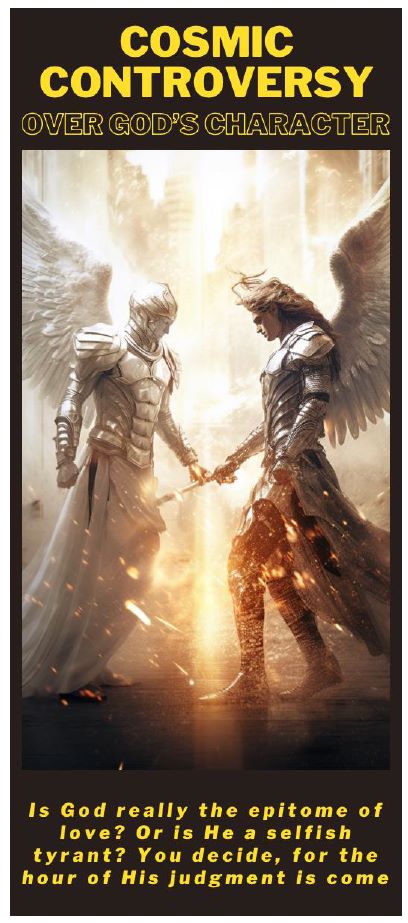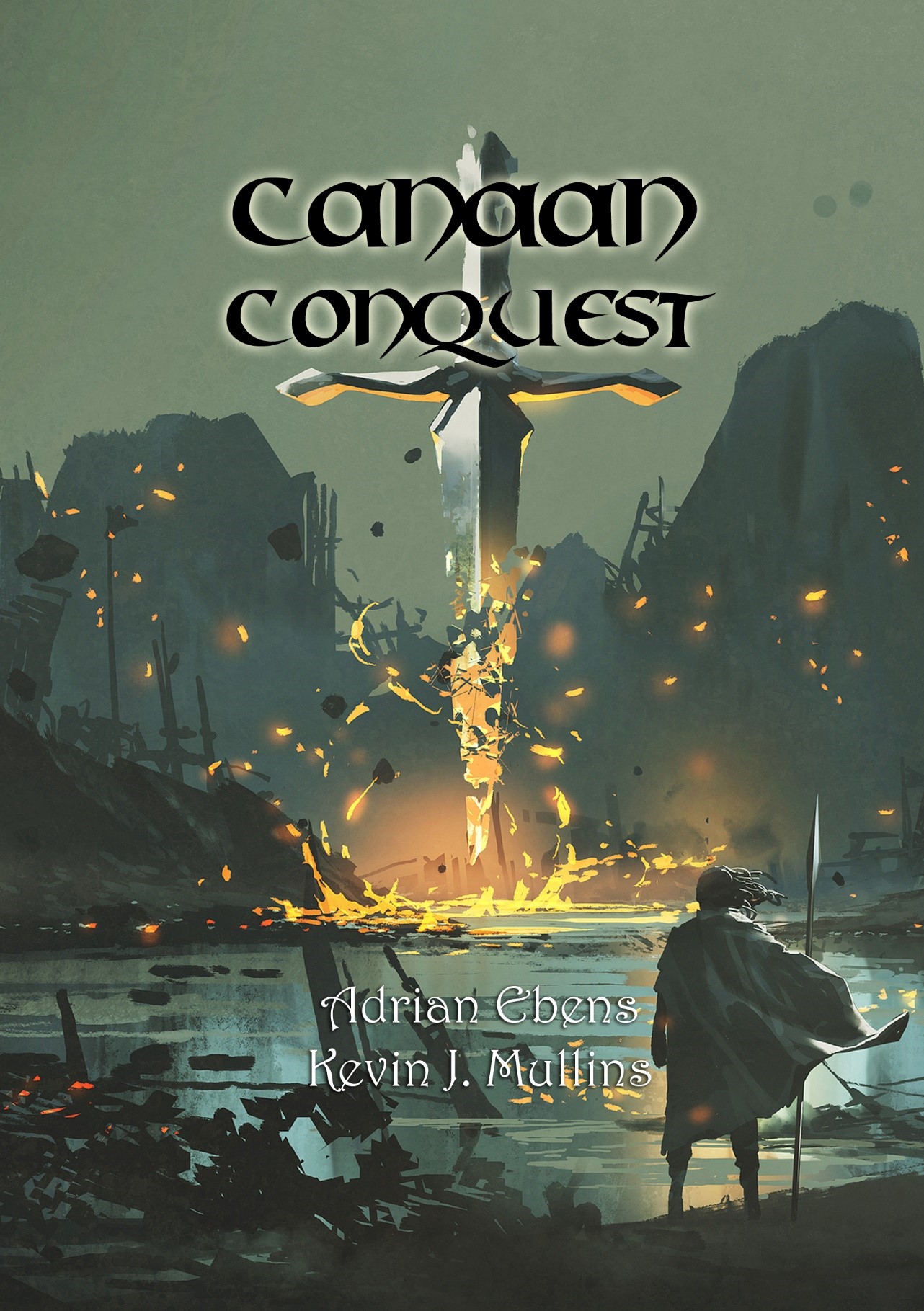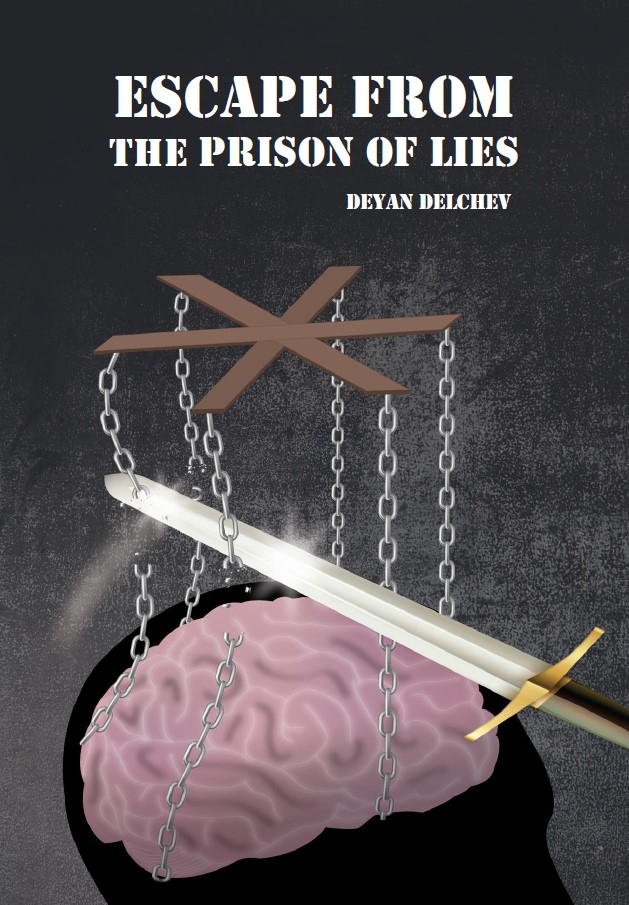(Exodus 20:24) Why Did God Institute Animal Sacrifices?
Updated December 2, 2024
“An altar of earth you shall make for Me, and you shall sacrifice on it your burnt offerings and your peace offerings, your sheep and your oxen. In every place where I record My name I will come to you, and I will bless you.” (Exodus 20:24)
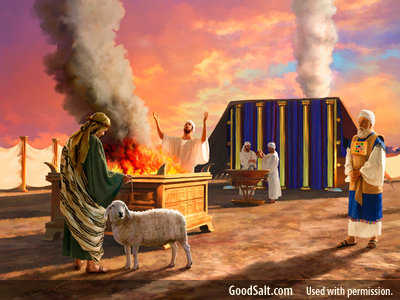 One of the main reasons that the true heartbreak of the Cross is missed is because of the institution of the sacrificial system in the Old Testament, which seems alien to us in 21st century.
One of the main reasons that the true heartbreak of the Cross is missed is because of the institution of the sacrificial system in the Old Testament, which seems alien to us in 21st century.
“ … On the tenth of this month every man shall take for himself a lamb … Your lamb shall be without blemish, a male of the first year. You may take it from the sheep or from the goats. Now you shall keep it until the fourteenth day of the same month. Then the whole assembly of the congregation of Israel shall kill it at twilight. And they shall take some of the blood and put it on the two doorposts and on the lintel of the houses where they eat it.” (Exodus 12:3–7)
The impression these texts give is that God wants people to kill animals in sacrifice to Him and that when they do this He will bless them. But did God require these sacrifices? Does His justice demand that His wrath be appeased with a sacrifice like the pagan gods of the other nations? Below is a brief description of man’s understanding of blood sacrifices:
Britanica.com. – blood sacrifices: “Basic to both animal and human sacrifice is the recognition of blood as the sacred life force in man and beast. Through the sacrifice—through the return of the sacred life revealed in the victim—the god lives, and, therefore, man and nature live. The great potency of blood has been utilized through sacrifice for a number of purposes—e.g., earth fertility, purification, and expiation. The letting of blood, however, was neither the only end nor the only mode of human and animal sacrifice.
A wide variety of animals have served as sacrificial offerings. In ancient Greece and India, for example, oblations included a number of important domestic animals, such as the goat, ram, bull, ox, and horse. Moreover, in Greek religion all edible birds, wild animals of the hunt, and fish were used. In ancient Judaism the kind and number of animals for the various sacrifices was carefully stipulated so that the offering might be acceptable and thus fully effective. This sort of regulation is generally found in sacrificial cults; the offering must be appropriate either to the deity to whom or to the intention for which it is to be presented. Very often the sacrificial species (animal or vegetable) was closely associated with the deity to whom it was offered as the deity’s symbolic representation or even its incarnation.
Thus, in the Vedic ritual the goddesses of night and morning received the milk of a black cow having a white calf; the ‘bull of heaven,’ Indra, was offered a bull, and Surya, the sun god, was offered a white male goat. Similarly, the ancient Greeks sacrificed black animals to the deities of the dark underworld; swift horses to the sun god Helios; pregnant sows to the earth mother Demeter; and the dog, guardian of the dead, to Hecate, goddess of darkness. The Syrians sacrificed fish, regarded as the lord of the sea and guardian of the realm of the dead, to the goddess Atargatis and ate the consecrated offering in a communion meal with the deity, sharing in the divine power. An especially prominent sacrificial animal was the bull (or its counterparts, the boar and the ram), which, as the representation and embodiment of the cosmic powers of fertility, was sacrificed to numerous fertility gods (e.g., the Norse god Freyr; the Greek ‘bull of the earth,’ Zeus Chthonios; and the Indian ‘bull of heaven,’ Indra).”
Behold the Lamb of God!
When John the Baptist presents the Messiah to the world, he presents Him as the Lamb of God:
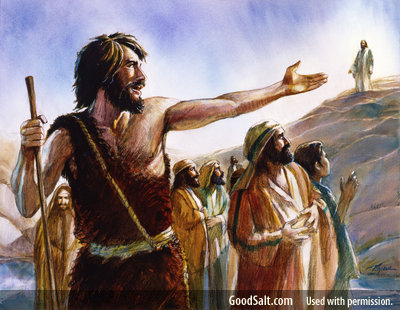 “The next day John saw Jesus coming toward him, and said, ‘Behold! The Lamb of God who takes away the sin of the world!’” (John 1:29)
“The next day John saw Jesus coming toward him, and said, ‘Behold! The Lamb of God who takes away the sin of the world!’” (John 1:29)
The New Testament writers are clear that all the animal sacrifices throughout the Hebrew Scriptures represented Jesus who would die upon the cross to take away our sins. Even Isaiah prophesied of the coming Messiah 700 years before Jesus saying, “He was oppressed and afflicted, yet He did not open His mouth. He was led like a lamb to the slaughter, and as a sheep before her shearers is silent, so He did not open His mouth” (Isaiah 53:7).
In the book of Exodus God instructs His people saying, “Your lamb shall be without blemish, a male of the first year: you shall take it out from the sheep, or from the goats” (Exodus 12:5). This is why the apostle Peter wrote that we were redeemed “with the precious blood of Christ, as of a lamb without blemish and without spot” (1 Peter 1:19).
If Jesus is the Lamb of God that was sacrificed, then the logical inference many people draw is that God wanted His Son to be killed to pay for our sins. Within this paradigm, mankind is not murdering the Son of God by nailing Him to a cross but doing what God wants. But have we mistakenly justified ourselves in murdering Jesus?
The apostle John tells us that “God is love” (1 John 4:8). Does love really require death in order to forgive? Did God really institute animal sacrifices for His wrath to be appeased like all the other pagan deities? If so, was God angry with us until His Son died and then somehow His wrath was appeased? Were animal sacrifices merely an appetizer until God had the blood of a human sacrifice? We will seek to find answers to these questions from the Bible.
It Pleased the LORD to Bruise Him
A verse that appears to support the view that God needed His Son to die in order to forgive us is also found in Isaiah chapter 53:
“Yet it pleased the LORD to bruise Him; He has put Him to grief. When You make His soul an offering for sin, He shall see His seed, He shall prolong His days, and the pleasure of the Lord shall prosper in His hand.” (Isaiah 53:10)
If it pleased the Lord to bruise His Son on the Cross in sacrifice, then the impression many receive is that God needed this sacrifice to satisfy His anger against our sin. This false reasoning teaches us that the justice of God needed to be satisfied and in order to show how bad our sins are, Jesus had to take our place in death to satisfy the Father’s justice. From this perspective, what becomes important is that He is divine and that He died — the healings and teachings are just bonus.
Isaiah however tells us the pleasure of the LORD comes from the fact that “He will see His seed”, meaning all those who have been pricked in the heart and conscience, repenting of their sins, and permitting His Spirit to live in and through them.
The author of the book of Hebrews teaches that “the pleasure of the LORD” is the pleasure Christ felt “who for the joy that was set before Him [you and I] endured the cross, despising the shame, and is [now] set down at the right hand of the throne of God” (Hebrews 12:2). The “pleasure” or “joy” was not that His Son was dying to satisfy God’s justice but was for those who would be drawn to His everlasting love. Jesus told us that the result of Him being lifted up on the cross was not to appease an angry God but to “draw all men unto Me” (John 12:32).
Saved From the Wrath of God?
But doesn’t Paul tell us that Jesus’ death saved us from the wrath of God?
“Much more then, having now been justified by His blood, we shall be saved from wrath through Him. For if when we were enemies we were reconciled to God through the death of His Son, much more, having been reconciled, we shall be saved [from that wrath] by His life.” (Romans 5:9, 10)
If you look closely, Paul actually says we are saved from wrath by His LIFE, not His death. As we look at the word “wrath” I would like to draw your attention to our online article entitled, What is God's Wrath? where we learn that God's wrath is not about God killing the sinner out of vengeful anger for breaking His so-called rules, but tearfully allowing the persistent sinner to reap what they naturally sow as they willingly step out from under His protective hedge.
 Furthermore, sin is toxic, and spreads its corruption and destruction not only upon people, but upon the environment around us (Isaiah, 24:4,5; Romans 8:22). Thus, the lamb also symbolizes that sin kills the guilty and the innocent, ourselves and others, including the animals who find our world impossible to live in and are going extinct.
Furthermore, sin is toxic, and spreads its corruption and destruction not only upon people, but upon the environment around us (Isaiah, 24:4,5; Romans 8:22). Thus, the lamb also symbolizes that sin kills the guilty and the innocent, ourselves and others, including the animals who find our world impossible to live in and are going extinct.
The "life" which will bring salvation Paul is talking about is Christ's present life as His Spirit works in and through us as a result of "justification" and "reconciliation." Justification is an adJUSTment of our mind and heart towards God which brings about reconciliation. Although we "shall be [future tense] saved from wrath [killing ourselves] by the [present] life of Christ", how is it that we are reconciled to God through His death? I believe George Fifield (1859-1926) explains it best:
“God does not need to be reconciled to man, for, like the mother’s love, His love ever follows us, even when we are in the downward way, seeking to bring us back to Him. But man needs to be reconciled to God. In some way there must be an atonement made. Not that God’s wrath must be satisfied, so that He will look with favor upon offending man, but that God’s love must be so manifest, in spite of the existence of suffering and sin, that men will turn their hearts toward Him, as the flower toward the sun … The word ‘atonement’ means at-one-ment. Sin had brought misery, and misery had brought a misunderstanding of God’s character. Thus men had come to hate God instead of loving Him; and hating Him, the one Father, men also hated man, their brother. Thus, instead of the one family and the one Father, men were separated from God and from each other, and held apart by hatred and selfishness. There must be an atonement. An atonement can be made only by God so revealing his love, in spite of sin and sorrow, that men’s hearts will be touched to tenderness; and they, being delivered from Satan’s delusions, may see how fully and terribly they have misunderstood the divine One, and so have done despite to the Spirit of his grace. Thus they may be led, as returning brethren, to come back to the Father’s house in blissful unity. The atonement is not to appease God’s wrath so that man dare come to Him but it is to reveal His love so that they WILL come to Him. It was not Christ reconciling God unto the world, but God in Christ reconciling the world unto himself. It is nowhere said that God needed to be reconciled unto us; he says, 'I have not forsaken you, but you have forsaken me.'” (George Fifield, God Is Love, pp. 46,48)
Seeing the true character of God manifested through the life and death of His Son, we are reconciled to Him as our wrong understanding of our Father is corrected. Jesus revealed to us that God has never been a stern judge waiting to punish us, but that He is an endearing Father who has been eagerly doing all that He can for His prodigal children to return home.
When we are reconciled back to God, by fully trusting and believing in His everlasting mercy, we will be saved from wrath (killing ourselves and killing others who we condemn and refuse to forgive). Those who will eternally die are those who do not trust and believe in God's FREE forgiveness, thus cutting it off themselves. As a result, since they wrongly believe God is the One who killed Christ instead of killing us, they wrongly believe that God is the One killing them since they rejected the offer. They perceive God pulling away as Him rejecting them, when in reality they have rejected Him and pushed Him away. The misunderstanding that men have had about the character of God must be removed, otherwise atonement cannot take place.
Isaiah prophesied that man would wrongly assume that Christ was punished and tortured by God for our sins when in fact it was our sin that killed Him:
"He was despised and abandoned by men, A man of great pain and familiar with sickness; And like one from whom people hide their faces, He was despised, and we had no regard for Him. However, it was our sicknesses that He Himself bore, And our pains that He carried; Yet we ourselves assumed that He had been afflicted, struck down by God, and humiliated." (Isaiah 53:3, 4, New American Standard Version)
During the night of the Last Supper, before His death, we read, "When Judas had eaten the bread, Satan entered into him. Then Jesus told him, 'Hurry and do what you’re going to do'” (John 13:27, New Living Translation). The whole betrayal and plot to kill Jesus was the masterplan of Satan, not God. God did not kill His Son in order to accomplish retributive justice. Please see the article entitled: Doesn't Zechariah Say That God Killed Jesus? for more details on this.
God wanted people to listen to His Son and be saved by His life and teachings, and if they had done so, Israel would not have been destroyed by Rome. But God could still save even in their rejection, painful as it was, for after they reaped what they had sown they might come to recognition of their stubbornness, hatred of God, and need for a Savior. It is in this sense that Jesus' death saved us, not that God's anger required death before He could forgive and give His Holy Spirit. The theory of Penal Substitutionary Atonement, taught by so many today, has no place in the everlasting gospel.
“The penal substitution theory teaches that Jesus suffered the penalty for mankind's sins. Penal substitution derives from the idea that divine forgiveness must satisfy divine justice, that is, that God is not willing or able to simply forgive sin without first requiring a satisfaction for it.” (Wikipedia)
Christ Set Forth to be a Propitiation
In the book of Romans, Paul writes:
“[Christ] whom God hath set forth to be a propitiation through faith in His blood, to declare His righteousness for the remission of sins that are past, through the forbearance of God; To declare, I say, at this time His righteousness: that He might be just, and the justifier of him which believeth in Jesus.” (Rom 3:25-26)
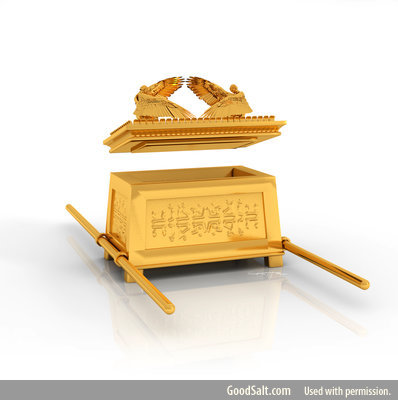 The Greek word used for propitiation here is ἱλαστήριον (hilasterion), which actually means "mercy seat." Yes, it's referring to the lid of the Ark of the Covenant. This word is used only one other time in the Greek New Testament where the writer of Hebrews is discussing the mercy seat lid of the Ark:
The Greek word used for propitiation here is ἱλαστήριον (hilasterion), which actually means "mercy seat." Yes, it's referring to the lid of the Ark of the Covenant. This word is used only one other time in the Greek New Testament where the writer of Hebrews is discussing the mercy seat lid of the Ark:
“And over it the cherubim of glory shadowing the mercyseat; (hilasterion) of which we cannot now speak particularly” (Hebrews 9:5)
In other words, Paul was saying "Christ is set forth to be a mercy seat." This suggests that hilasterion is a place where mercy is given. Now, hilasterion is a derivative of the word ἱλάσκομαι (hilaskomai) which means, "be merciful, make reconciliation." The only two verses that use hilaskomai are:
“And the publican, standing afar off, would not lift up so much as his eyes unto heaven, but smote upon his breast, saying, God be merciful (hilaskomai) to me a sinner.” (Luke 18:13)
“Wherefore in all things it behoved Him (Jesus) to be made like unto His brethren, that He might be a merciful and faithful High Priest in things pertaining to God, to make reconciliation (hilaskomai) for the sins of the people.” (Hebrews 2:17)
So, Paul is not trying to tell us that God needed to be appeased, but instead that God presented Jesus as the way and the means of restoration (reconciliation/atonement) through the established evidence of God’s true character revealed in Christ. By Christ revealing God's true character to us, we become reconciled to God through Christ. Not because He appeased God's wrath, but that we now finally believe and trust that "God is love" and that He never condemned us nor needed to be appeased in any way shape or form.
I believe E.J. Waggoner (1855-1916) gives us the correct view of why Christ became a “propitiation”:
“A Propitiation. - A propitiation is a sacrifice. The statement then is simply that Christ is set forth to be a sacrifice for the remission of our sins. ‘Once in the end of the world hath he appeared to put away sin by the sacrifice of himself.’ Hebrews 9:26. Of course the idea of a propitiation or sacrifice is that there is wrath to be appeased. But take particular notice that it is we who require the sacrifice, and not God. He provides the sacrifice. The idea that God’s wrath has to be propitiated in order that we may have forgiveness finds no warrant in the Bible. It is the height of absurdity to say that God is so angry with men that he will not forgive them unless something is provided to appease his wrath, and that therefore he himself offers the gift to himself, by which he is appeased … The Christian idea of propitiation is that set forth above. The heathen idea, which is too often held by professed Christians, is that men must provide a sacrifice to appease the wrath of their god. All heathen worship is simply a bribe to their gods to be favorable to them. If they thought that their gods were very angry with them, they would provide a greater sacrifice, and so human sacrifices were offered in extreme cases [Micah 6:6-8]. They thought, as the worshipers of Siva in India do today, that their god was gratified by the sight of blood.” (E.J. Waggoner, The Signs of the Times, Vol. 22, January 23, 1896)
I pray you can see how it is wrong to believe that God would ever hold back forgiveness until something, or someone, makes a satisfactory payment. John says that "we love Him, because He first loved us" (1 John 4:19). God is the One who has made all the initiatives towards reconciliation.
What is the "Forbearance of God"?
We read earlier that all of this was accomplished "through the forbearance of God" (Romans 3:25). The Greek word for "forbearance" is ἀνοχή (anoché) which is defined as, "suspense or delay (of punishment), patience." This should be read in the sense that God is giving us ample time to make a decision. In other words, God's mercy is holding unnecessary judgment back. Not that He is going to unleash any destructive power from within Himself, but that He is holding back the destructive power of Satan and his angels until we all make our decision. God's "punishment" and "judgment" is to let us naturally reap what we ourselves have sown. In Revelation 7 we read:
"And after these things I saw four angels standing on the four corners of the earth, holding the four winds of the earth, that the wind should not blow on the earth, nor on the sea, nor on any tree. And I saw another angel ascending from the east, having the seal of the living God: and he cried with a loud voice to the four angels, to whom it was given to hurt the earth and the sea, Saying, Hurt not the earth, neither the sea, nor the trees, till we have sealed the servants of our God in their foreheads." (Revelation 7:1-4)
This is not saying that the four angels themselves will hurt the earth, but it's "the four winds" of strife that will. After everyone has made their final decision based on the "propitiation" (mercy) of Christ in giving the world all the evidence concerning the true character of God, the angels will let go and permit the "destructive winds" to have their way. The only ones who will be safe at this time are those who have received the seal of God in their foreheads (their mindset). In Revelation chapter 14, John tells us what this "seal" in the forehead is:
"Then I looked and saw the Lamb (Jesus) standing on Mount Zion, and with Him 144,000 who had His name and His Father’s name written on their foreheads." (Revelation 14:1; Berean Study Bible)
Having the "name" of Christ and His Father written on our foreheads represents the true understanding of Their character; for Christ said, "If you've seen Me, you've seen the Father" (John 14:9). Everything Christ did on earth was to reveal the true character of His Father.
but to display the Father's true character as a fulfillment of the Law — completely self-sacrificing, full of service for others, and patiently enduring rejection
while calling for His children, allowing them to decide their own relation to Him
A little later in the evening after Judas' betrayal, Jesus prayed to His Father saying: "I have glorified Thee on the earth: I have finished the work which Thou gavest Me to do" (John 17:4). Jesus had finished the work His Father gave Him to do the night BEFORE His death. That work was to glorify the Father's true character which He did all throughout His life, which saves us from wrath (the removal of God's protective presence). True reconciliation is accomplished when we, through the demonstration of Christ, see the evidence that we have a tender loving Father who loves us with "an everlasting love" simply because we are His children (Jeremiah 31:3). Christ showed us that God is tender and loving, not an abusive Father who needs to see blood when we displease Him. Remember, it is man that needs to be reconciled to God, not the other way around. God's love, acceptance and forgiveness has never changed toward us. It is our love and acceptance that has changed, distrusting in God's everlasting forgiveness and kindness.
After His prayer, Judas returns with the priests and Roman soldiers to arrest Jesus. At this time Jesus says, "When I was daily with you in the temple, ye stretched forth no hands against Me: but this is your hour, and the power of darkness" (Luke 22:53). Again, the whole process of killing the Son of God was the work of Satan as he influenced man with "the power of darkness."
Did God Really Want or Require
Animal Sacrifices to Appease Him?
Wikipedia: “Animal sacrifice is the ritual killing and offering of one or more animals, usually as part of a religious ritual or to appease or maintain favour with a deity.”
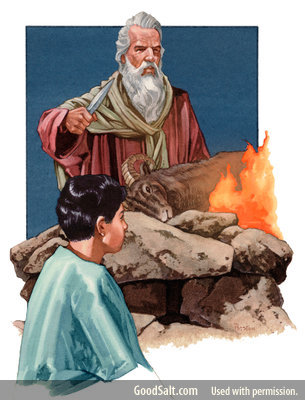 What does the God of the Bible say?
What does the God of the Bible say?
“Sacrifice and offering You did not desire; My ears You have opened. Burnt offering and sin offering You did not require.” (Psalm 40:6)
The Bible plainly states that God did not want sacrifices. It also plainly states that He did not require burnt offerings and sin offerings. Further to this, in Jeremiah 7:22-23 we read:
“For I did not speak to your fathers, or command them in the day that I brought them out of the land of Egypt, concerning burnt offerings or sacrifices. But this is what I commanded them, saying, ‘Obey My voice, and I will be your God, and you shall be My people. And walk in all the ways that I have commanded you, that it may be well with you.’”
How can God say that He did not command the children of Israel about offering burnt offerings and sacrifices when it appears obvious that He did command them to offer the Passover and established the sacrificial system? Is the Bible contradicting itself here? Let’s look at another example found in the story of King Saul:
“ ‘Tomorrow about this time I will send you a man from the land of Benjamin, and you shall anoint him [as] commander over My people Israel, that he may save My people from the hand of the Philistines; for I have looked upon My people, because their cry has come to Me.’ So when Samuel saw Saul, the Lord said to him, ‘There he is, the man of whom I spoke to you. This one shall reign over My people.’” (1 Samuel 9:16, 17)
In this story, God is commanding His prophet Samuel to anoint Saul to be king over the people of Israel. In the immediate context it appears that God is the one who is commanding these things. The broader context is that Israel wanted a king and God gave to them their request.
“But the thing displeased Samuel when they said, ‘Give us a king to judge us.’ So Samuel prayed to the Lord. And the Lord said to Samuel, ‘Heed the voice of the people in all that they say to you; for they have not rejected you, but they have rejected Me, that I should not reign over them. According to all the works which they have done since the day that I brought them up out of Egypt, even to this day—with which they have forsaken Me and served other gods—so they are doing to you also.’” (1 Samuel 8:6–8)
The Bible confirms that God did not want to give Israel a king but allowed them to have one:
“ ‘O Israel, you are destroyed, but your help is from Me. I will be your King; Where is any other, that he may save you in all your cities? And your judges to whom you said, ‘Give me a king and princes’? I gave you a king in My anger, and took him away in My wrath.’” (Hosea 13:9–11)
What does it mean that God gave Israel a king in His anger? God's anger is expressed by letting man have the wrong things that man desires (again, see the aforementioned article entitled, What is God's Wrath for more info on this). The Bible shows in several places God commanding things to man that man desires. After Adam sinned, he charged the Son of God with the responsibility for the actions which he believed incurred a death sentence and feared God would execute upon him.
“And the man said, The woman whom Thou gavest to be with me, she gave me of the tree, and I did eat.” (Genesis 3:12)
Because of Satan’s virus of sin being injected into man, “the carnal mind is hostile against God” (Romans 8:7) and completely selfish. In order to escape death, Adam shifted the blame and poured his wrath of condemnation upon the Son of God and his own wife (Eve). He was willing for Christ or Eve to die in his place. When God said “Thou shalt surely die”, Adam thought that God’s justice demanded death. Sin had tricked him into misinterpreting God's words as being a threat instead of a loving warning. He failed to realize that it is the disease of sin which naturally brings death (Romans 6:23; James 1:14, 15), not God.
He also reasoned that blame could be shifted and that another could pay the debt he believed God demanded. Therefore, it was Adam, in his wrong state of mind, who introduced the concept of penal substitution and therefore we have all inherited this unhealthy mindset resulting in our misapprehension of God’s true character. Thus, Christ became “the Lamb slain from the foundation of the world” (Revelation 13:8).
Keep in mind, Adam came to this thinking through fear. After he and his wife sinned, they "hid themselves from the presence of the LORD God among the trees of the garden" (Genesis 3:8). After God called out to them, "Where are you?" (verse 9), Adam responded, "I heard Your voice in the garden, and I was afraid, because I was naked; and I hid myself" (verse 10). It was fear that caused this faulty thinking. God does not accept worship through fear, but love; for "there is no fear in love; but perfect love casts out fear: because fear has torment. He that fears is not made perfect in love" (1 John 4:18). Please notice how Strong's Exhaustive Concordance defines the word torment here:
κόλασις (kolasis):
From kolazo; penal infliction — punishment, torment.
In other words, "there is no fear in love; but perfect love casts out fear: because fear has the concept of penal infliction tied to it." And since "God is love" (1 John 4:8), then there has never been, nor will there ever be, any concept of penal infliction (atonement) in God.
of sin and that this is not God’s character, then the darkness will vanish and the atonement can be completed
In order for Adam to see what was in his heart, God commanded the sacrificial system, knowing that everyone born from Adam would inherit the propensity of submitting to this warped mindset. Like having an earthly king, the sacrificial system is a reflection of what man is thinking, not what God is thinking. The sacrificial system is a mirror into the mind of man. In this context you can harmonize the texts of the Bible about the sacrifices.
“So Samuel said: ‘Has the Lord as great delight in burnt offerings and sacrifices, as in obeying the voice of the Lord? Behold, to obey is better than sacrifice, and to heed than the fat of rams.’” (1 Samuel 15:22)
God simply wants us to trust and obey Him by trusting in His grace. He did not desire to give men sacrifices, but He had to command that which was in the heart of man to show him his sinfulness. God commanded them the things that were in their hearts in order to cause sin to abound (Romans 5:20). Their hearts were full of sacrifice and offering. Is this not what they did around the golden calf? So God gave them commandments to show them the extent of their carnal mind.
“Therefore I also gave them up to statutes that were not good, and judgments by which they could not live.” (Ezekiel 20:25, New King James Version)
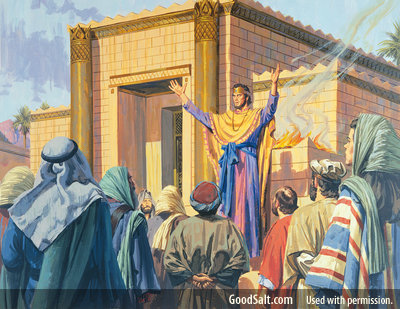 How can it be that God gives things to His people by which they cannot live? He gives them the things that they want. He gave them up to their own statutes that were not good. God would give commands on how a king should act and how sacrifices should be done so as to teach them as much as He could through them, but they remain less than ideal systems which He knew would degrade over time (see the history of Israel's kings).
How can it be that God gives things to His people by which they cannot live? He gives them the things that they want. He gave them up to their own statutes that were not good. God would give commands on how a king should act and how sacrifices should be done so as to teach them as much as He could through them, but they remain less than ideal systems which He knew would degrade over time (see the history of Israel's kings).
How far would the human mind travel in distorting the true purpose of why God instituted animal sacrifices? How far would man go in thinking these sacrifices were to appease an angry God? When the temple was being dedicated, “King Solomon offered a sacrifice of twenty-two thousand bulls and one hundred and twenty thousand sheep (2 Chronicles 7:4–5).
Where did God require all these things? The Bible says that God did not desire sacrifice and offering. Men were even willing to sacrifice their own children to please the god they imagined. What does the Scripture say?
“Will the LORD be pleased with thousands of rams, ten thousand rivers of oil? Shall I give my firstborn for my transgression, the fruit of my body for the sin of my soul? He has shown you, O man, what is good; and what does the LORD require of you but to do justly, to love mercy, and to walk humbly with your God.” (Micah 6:7, 8)
Here is an excerpt of a great online article explaining the biblical meaning of why God instituted animal sacrifices written by Greg Boyd:
Reknew.org: “The first thing I’d say about animal sacrifices in the Old Testament is that it’s important to know that all Ancient Near Eastern people sacrificed animals as a way of appeasing the gods. In fact, this has been a staple of human religion around the world from the start, as Genesis 4 (with Cain and Abel’s sacrifice) illustrates … I suspect this reflects the fallen human sense that we are estranged from God and that he’s angry about it, so we instinctively want to do something to rectify this … In fact, the way some Old Testament authors refer to the sacrifice as producing “a pleasing aroma to God” reflects the cultural indebtedness of this practice, for we find this same phrase used by other people long before the Israelites. Since God must relate to people where they are at in order to gradually lead them forward, just as a missionary must do when going to pagan cultures, it seems to me that God accepted this barbaric practice as an accommodation to his fallen, culturally conditioned people. In fact, Leviticus 17:7 indicates that God commanded animal sacrifices as a way of helping his people to stop worshipping demons. So, as is often the case with God’s dealings with fallen people, it seems this command doesn’t reflect God’s ideal will. It rather reflects his accommodating will as God must choose between the lesser of two evils. (I could give hundreds of examples of this in the Old Testament, e.g., why God allowed polygamy and concubines.)”
Without the Shedding
of Blood There is no Forgiveness?
God wanted people to trust Him and receive His grace to obey. He didn’t desire sacrifices to be appeased. A text that many refer to in response to this is the following:
“Indeed, under the law almost everything is purified with blood, and without the shedding of blood there is no forgiveness of sins.” (Hebrews 9:22, English Standard Version)
Here’s what a couple of online articles have to say attempting to explain this:
Christianity.com: “Unlike other deities of the time, an angry God was not being ‘appeased’ by these offerings. Rather, in His love, He offered a way for His people’s sin to be covered over, so that they could approach Him. Rebellion and sin required death. They were not to be taken lightly. In order for the Israelites to gain forgiveness, something had to die. It was a painful process, yes. That was the point. Sin led to death. It was serious. In order to avoid their own destruction because of their sin, the Israelites had to offer something innocent to die in their place—in this case, an animal without blemish.”
GotQuestons.org: “God required animal sacrifices to provide a temporary covering of sins and to foreshadow the perfect and complete sacrifice of Jesus Christ (Leviticus 4:35, 5:10). Animal sacrifice is an important theme found throughout Scripture because 'without the shedding of blood there is no forgiveness' (Hebrews 9:22). When Adam and Eve sinned, animals were killed by God to provide clothing for them (Genesis 3:21) ... Animal sacrifices foreshadowed Christ’s sacrifice on our behalf. The only basis on which an animal sacrifice could provide forgiveness of sins is Christ who would sacrifice Himself for our sins, providing the forgiveness that animal sacrifices could only illustrate and foreshadow.”
However, we have already shown that what these two articles have to say is in opposition to what the God of the Bible has to say.
First of all, Scripture never says that God killed animals to provide Adam and Eve clothing. It simply says that God provided them with animal skins for clothing. A much better conclusion would be that Adam and Eve took the life of the animal to reveal that it was mankind who would kill Jesus. God did not kill His Son. He offered up His Son alive, giving Him over to us, and we killed Him.
Secondly, God has never required any type of sacrifice in order to forgive us. In fact, the Greek text of Hebrews 9:22 doesn't say "forgiveness of sins" as the above example wrongly shows. It actually says "there is no remission." The author is describing something going into remission when we (not God) see the shedding of blood. The death of Christ was not meant to change God's mind toward us, but to change our minds toward God. Here's how Jeremy Myers explains it:
"The first thing to notice about the context of Hebrews 9:22 is that the author is clearly contrasting the sacrificial system of the Mosaic Law with what Jesus accomplished in His death on the cross. One way to note this is by looking back to Hebrews 9:15, which is the opening statement in the larger context of this discussion about sacrifice and blood. In Hebrews 9:15, the author writes about the 'redemption of the transgressions.' The word used there is not the normal word for 'sin' in the NT, but is parabaino (STR: 3847), and means to overstep or go beyond the boundaries. The TDNT [Theological Dictionary of the New Testament] says that parabaino is closely connected with sin in the New Testament, but primarily in the sense of using human tradition to disobey the law of God while claiming to be the fulfillment of the law. In other words, parabaino takes place when someone tries to explain and apply the law of God, but actually ends up doing the exact opposite of what the law says. The author of Hebrews indicates that Jesus came to redeem sin, that is, to redeem the parabaino type of sin. More specifically still, Jesus came to redeem the sin of misusing the law. It is this issue that concerns the author of Hebrews." (Jeremy Myers, Is the Shedding of Blood Required for the Forgiveness of Sins?,redeeminggod.org)
The true reason why God’s Law states “without the shedding of blood there is no remission” is because the Law is a mirror to show what is in the human heart. It is fallen humanity who require punishment and compensation from those who have done them wrong before they will forgive — and we see this concept in all human cultures; it's called "blood money." Yet, millions believe this is just what God has required.
“Therefore by the deeds of the Law no flesh will be justified in His sight, for by the Law is the knowledge of sin.” (Romans 3:20)
It is not by the deeds of offering the sacrifices of the Law that men are justified — "For it is not possible that the blood of bulls and of goats should take away sins” (Hebrews 10:4) — but it is through seeing that offering sacrifices is what is in our nature and then repenting of this sin, recognizing how this whole type of thinking hurts Jesus. The Law brings the seed into the open so that it might be confessed.
no forgiveness", but rather it is man who believes this because he can’t believe God will forgive him unless he does a sacrifice
The literal definition of the word forgiveness is “to release a debt.” If God had set the ransom price of death and needed to punish Jesus in order to forgive us and appease His wrath, He would have gotten paid and didn’t really forgive anything. God did not forgive us because Jesus died on the cross due to the fact that the cross doesn't provide or achieve God's forgiveness, it displays it! Remember, the night before He died Jesus prayed to His Father saying:
“I have glorified You on the earth. I have finished the work which You have given Me to do.” (John 17:4)
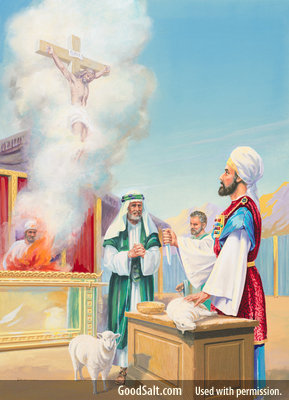 If Christ finished the work that His Father gave Him to do the night before He died, then God did not need His Son to die. He only needed to show us His loving merciful character. Think about it, if it were true that in order to gain forgiveness something had to die, and if God needed Jesus to die for our sins to satisfy His justice in order that we may be forgiven, what would have happened if everyone had accepted Jesus and He was not crucified? Would we all be lost?
If Christ finished the work that His Father gave Him to do the night before He died, then God did not need His Son to die. He only needed to show us His loving merciful character. Think about it, if it were true that in order to gain forgiveness something had to die, and if God needed Jesus to die for our sins to satisfy His justice in order that we may be forgiven, what would have happened if everyone had accepted Jesus and He was not crucified? Would we all be lost?
The truth is, it's not God who needed Christ to die in order to forgive us, but WE needed Christ to die because to us in our natural state (warped thinking) there can be no forgiveness without punishment. For us to accept the forgiveness of God, the human race had to see Jesus die. In completing His Father’s work before dying on the cross, Jesus proved that death was not what God required. It was US who required such a sacrifice:
"But they cried, saying, Crucify Him, crucify Him. And he (Pilate) said unto them the third time, Why, what evil hath He done? I have found no cause of death in Him: I will therefore chastise Him, and let Him go. And they were instant with loud voices, requiring that He might be crucified. And the voices of them and of the chief priests prevailed. And Pilate gave sentence that it should be as they required." (Luke 23:21-24)
God's forgiveness is everlasting (read Psalm 118). He had forgiven us from day one, but sin clouded God's merciful face (expression) causing mankind to believe God had turned against man (Isaiah 59:2). Sin has deceived us, causing us to believe God needs to see blood to be appeased and for His justice to be satisfied. Out of Their unselfish love for us, God the Father gave His only begotten Son over to OUR faulty thinking.
Going back to Hebrews 9:22, the Greek word for "remission" is ἄφεσις (aphesis) which, although can carry the meaning of “pardon, complete forgiveness”, is actually “Derived from the Greek verb ἀφίημι (aphiēmi), meaning ‘to send away’ or ‘to release’” (Strong’s Concordance). Contrary to popular belief, the death of Christ was not meant to "release" God so He could finally forgive us. No, it is when we saw "the shedding of blood", in accordance with our faulty understanding of the atonement, that we were "released." Just before Jesus died, He cried out, “It is finished!” (John 19:30). He had finished the work of satisfying OUR justice system influenced by Satan and the power of darkness; thus "releasing" us from our faulty thinking, for it was the only way we would believe that God has forgiven us (John 3:16-17).
A New and Living Way
And now, as our minds are renewed, we will declare “there is no more offering for sin” (Hebrews 10:18) because the offering of Jesus would “purge your conscience from [these] dead works [animal offerings] so that we may serve the living God [His way]” (Hebrews 9:13, 14); that is, "by a new and living way" (Hebrews 10:20).
“For You do not desire sacrifices; else would I give it: You do not delight in burnt offerings. The sacrifices of God are a broken spirit: a broken and a contrite heart, O God, You will not despise.” (Psalm 51:16, 17)
The Psalmist continues saying: “Show favor to Zion in Your good pleasure; and rebuild the walls of Jerusalem. Then You will be pleased with pure sacrifices, with burnt offerings, and with whole burnt offerings. Then they will offer bulls on your altar.” (Psalm 51:18,19). This does not mean that God will one day be pleased with animal offerings. No. The setting here is after the rebuilding of “the walls of Jerusalem.” Daniel prophesied that the Messiah would arrive 69 prophetic weeks after the decree to “restore and rebuild Jerusalem ... the street shall be built again, and the wall, even in troublous times” (Daniel 9:25). After this, the Messiah would “confirm [strengthen] the covenant with many for one week [cf. Matthew 26:27-28; Romans 15:8] and in the midst of the week He shall cause the sacrifice and the oblation to cease” from our mindset (Verse 27). It is because of our Savior’s sacrifice when David’s words, “Then You will be pleased with pure sacrifices”, will come to pass.
Are bloody slaughter-offerings of literal “bulls” what God calls “pure sacrifices”? Not ever! The prophet Hosea explains:
“Take words with you and return to the Lord. Say to Him, ‘Completely forgive our iniquity and receive us graciously that we may offer the praise of the sacrificial bulls of our lips.’” (Hosea 14:2)
The author of the book of Hebrews expounds on this verse saying, “Through Him [Jesus] let us continually offer up a sacrifice of praise to God, that is, the fruit of our lips, giving thanks to His name [merciful character]” (Hebrews 13:15). Peter says, since “you have tasted that the Lord is good”, you will “offer spiritual sacrifices that are acceptable to God through Jesus Christ” (1 Peter 2:3-5). And then Paul concludes:
“I therefore urge you, brothers, in view of God’s mercies, to offer your bodies as living sacrifices that are holy and pleasing to God, for this is the reasonable way for you to worship.” (Romans 12:1)
To read a more detailed study concerning this topic, see the booklet, Why Did God Institute Animal Sacrifices?
For an abbreviated trifold tract of what you’ve just read, see Burnt Offering and Sin Offering You Did Not Require
For more info see the books:


